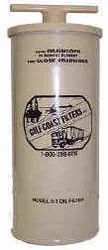A PO had installed these Gulf Coast bypass oil filters on my mains:

In theory, they're supposed to allow a longer interval between oil changes, which is handy when traveling.
I also feel like having extra oil in the engine inventory can't be a bad thing.
However, they're taking up room in the ER. When they're hot, it's hard to move around without touching them. It's a messy job changing them. And I'm not convinced they're anything more than just snake oil someone sold my PO.
Every time I change the oil, I wonder if I should just bite the bullet and remove them. I've got an oil change coming up.
Thoughts?

In theory, they're supposed to allow a longer interval between oil changes, which is handy when traveling.
I also feel like having extra oil in the engine inventory can't be a bad thing.
However, they're taking up room in the ER. When they're hot, it's hard to move around without touching them. It's a messy job changing them. And I'm not convinced they're anything more than just snake oil someone sold my PO.
Every time I change the oil, I wonder if I should just bite the bullet and remove them. I've got an oil change coming up.
Thoughts?
